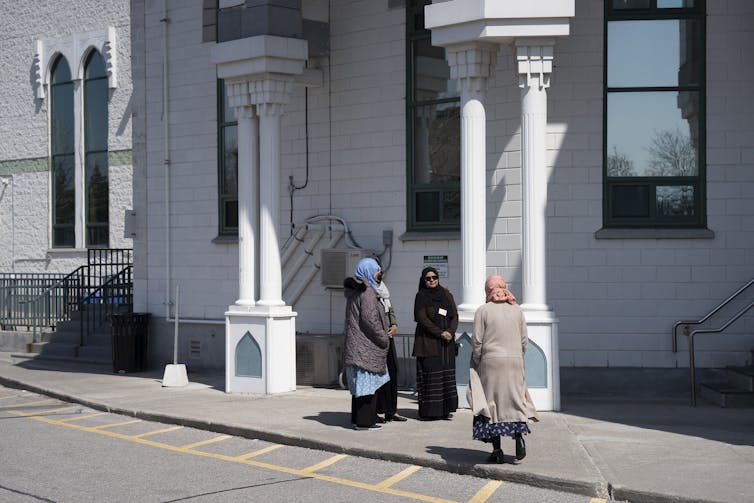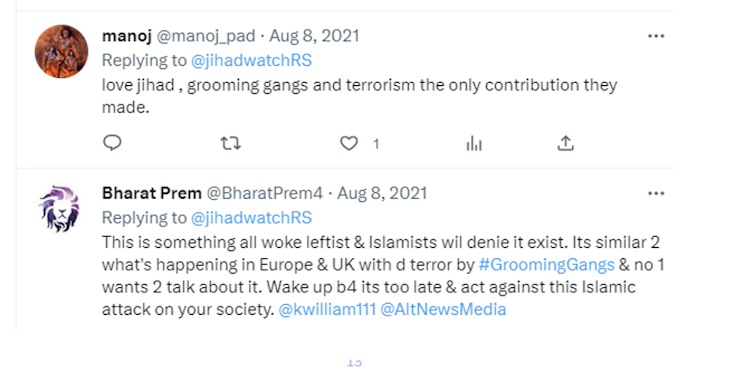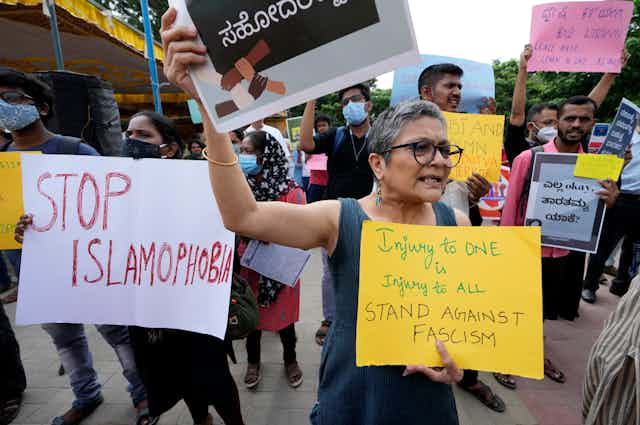During Ramadan, a man attacked a mosque in Markham, Ont. He allegedly yelled slurs, tore up a Qu'ran, and attempted to run down worshippers in his vehicle.
Some people on Twitter have raised the idea that the attacker was connected to Hindu extremist groups; however, the investigation is still ongoing.
This is one of two hate-motivated incidents at mosques in Markham in a week. Although police said they don’t believe the incidents are connected, as a researcher of online extremism I can theoretically link these events to a global trend of Islamophobic violence.
Legal discrimination and violence
From the United States’ Muslim ban, to India’s Citizenship Amendment Act, to Québec’s Bill 21, Muslims face legal discrimination globally.
Read more: Niqab bans boost hate crimes against Muslims and legalize Islamophobia — Podcast

Alongside these laws, Muslims face physical violence. This includes: the beating, lynching and burning of Muslims in India, the Christchurch massacre in New Zealand in 2019, the Québec City mosque shooting in 2017, and more recently the murder of the Afzaal family in London, Ont.
Collectively, these policies and killings demonstrate a transnational quality of Islamophobic prejudice and violence.
While the two incidents in Markham may not be directly linked to extremist groups, they have occurred within this global ecosystem of Islamophobia. To me, the attacks indicate that these online conspiracies do not occur in a vacuum and can have potentially horrifying real consequences.
Hindutva-based terrorism in Canada
Over the last several years, I have carefully examined the digital and transnational connections between white supremacists in North America and far right Hindu nationalists in India.
My preliminary findings show how these two seemingly unrelated extremist far-right groups have become increasingly allied on social media platforms as they position Muslims as a “common enemy.”
Rashtriya Swayamsevak Sangh (RSS), the right-wing Hindu nationalist organization, promotes the Hindutva ideology which believes India only belongs to Hindus.
A recent published report by the National Council of Canadian Muslims and the World Sikh Organization documents how this organization has gained ground in Canada. Jasmin Zine is a Canadian scholar whose recent report also outlines a network of Hindu nationalists that aids in the circulation of ideologies that promote Islamophobia.
Governments spreading misinformation
In 2014, the BJP, the most prominent Hindu nationalistic right-wing party in India came to power. Like the RSS, the BJP and other Hindu nationalist parties believe that India belongs only to Hindus.
Since elected, the BJP has actively spread misinformation and conspiracies about Muslims through social and mainstream media, intensifying hostilities between Muslims and Hindus.

While seemingly different on the surface from white supremacy, my research shows how these two movements similarly mobilize emotional rhetoric and visual content to spread their influence.
Twitter, as one of the main platforms for both groups, has been used extensively to perpetuate new forms of gendered Islamophobia and to forge surprising alliances and affinities.
The Love Jihad conspiracy
One of the conspiracy theories shared by these groups is called Love Jihad. Originating in India by Hindu nationalists in 2013, this conspiracy alleges Muslim men actively seduce non-Muslim women to marry and convert them to Islam.
The #LoveJihad hashtag was quickly picked up on social media by white extremists and other Islamophobic groups in North America, modulating it to fit their own conspiracies such as The Great Replacement.
This example demonstrates how anti-Muslim sentiment online spreads quickly and transnationally.
Groups I monitor on Twitter from India constantly talk about the perceived threat of Love Jihad. One such Hindu nationalist group, Hindu Jagruti Org, warns Hindu women against “dangerous, sexually aggressive” Muslim men. The tweet below is an example:
These tweets portray Muslim men as “deceitful, sexual monsters” who view Hindu women as “objects to fulfill their lust.” Hindu extremists argue that to combat these “Muslim monsters,” precautionary measures are needed.
#LoveJihad travels to North America
The #LoveJihad conspiracy was quickly taken up by Islamophobic groups in North America. For example, Robert Spencer, who runs Jihad Watch which has a large following among Hindu nationalists, tweeted the following:
The tweet includes an article that claims the Islamic State encourages Love Jihadis to target non-Muslim women and “abduct,” “forcibly convert, and marry” them.
Love Jihad has been proven a farce.
Yet, Spencer continues to claim there are “real cases that show how Muslim men have duped Hindu women into toxic romantic relations year after year.”
Responses from users to Spencer’s post demonstrate his success in establishing #LoveJihad as fact. For instance:

As these posts indicate, Love Jihad easily reinforces belief in Muslim men as “terrorists” and “groomers” — that is, men who create trust with girls and young women in order to exploit them.
Transnational alignment of hate
This shared intense hatred of “monstrous” Muslim men brings Hindu and white extremists into a “transnational affective alignment.” That is, the mutual hate of Muslims and a mutual love for Hindu and white national ideals.
Social media platforms such as Twitter are important in creating these alignments and perpetuating related conspiracies, gaining considerable traction through their repetition.
This alignment is produced through the demonization of Muslim men and extremists’ shared hate and fear of them across borders. Through transnational responses and retweets, extremists forge a layered and cumulatively condensed affective message: Muslim men are dangerous. We fear them. Thus, we hate them.
While it remains to be seen whether or not the recent mosque attackers were directly influenced by online, transnational and affective Islamophobia, recurring incidences such as this should remind us that hate does not abide by international borders.
Misinformation and conspiracies find fertile ground in the echo chambers of social media.
Our response to such crimes — and their online equivalents — must consider that the fear and hate of Muslims does not happen by accident.
As the #LoveJihad conspiracy demonstrates, strange bedfellows are easily made when there is a perceived common enemy. Conspiracies and acts of anti-Muslim hate impact us all.

